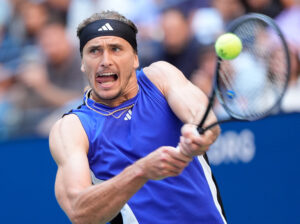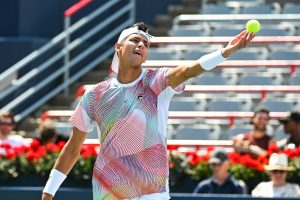There were so many good things in tennis in 2022 that it can be easy to forget all the bad things that happened, too. However, from the “No-Vax” furore at the start of the year to the dreadful scheduling of both the Billie Jean King Cup and the Davis Cup at the end of the year, there were awful players, matches and events that scarred the most beautiful of all the individual sports. Here are ten terrible things in tennis starting at the top – or, rather, the bottom.
Ten Terrible Things in Tennis
- ‘No-Vax’ Djokovic Being Thrown Out of Australia
This time last year, when mass vaccination programmes were beginning and finally hastening the end of the Covid-19 pandemic, Novak Djokovic was coming off the most successful year of even his extraordinary career. Indeed, in 2021 he had just enjoyed what was probably the greatest season that any male player has enjoyed in the Open Era, after he had won three Majors and got close to a Calendar Slam by losing in the final of the fourth, not to mention reaching the Olympic singles final and the Davis Cup semifinal while playing both singles and doubles for Serbia.
Even more importantly, it seemed that he had finally won at least a measure of the adoration that has poured down on Roger Federer and Rafael Nadal throughout their careers but that had hitherto largely escaped him. However, the furore over his vaccination status (or lack of it) made front pages around the world and eventually led to his being deported from Australia in January. And the Australian Open was not the only Major that he missed, as he was similarly prevented from competing at the last Major of the year, the US Open.
In the process, Djokovic has forfeited much of the good will that he had earned in 2021, when he came the closest of the Big Three to matching Rod Laver and Don Budge as the only man to win all four Majors in the same calendar year. He will almost certainly never get as close again, especially if he is banned from competing at any other Majors in the future, although he has now been cleared to compete in Australia again.
Djokovic may yet end up as the “Winningest” male tennis player ever, if he can overtake Nadal’s current record of 22 Major wins (and he is only one behind). However, his actions during the pandemic almost certainly mean that he will never enjoy the global adulation that both Federer and Nadal have almost always enjoyed. When Federer retired this year, the whole tennis world – indeed, the whole world – paid tribute, as it will whenever Nadal retires. Djokovic will likely have to go without.
2. Ash Barty’s Retirement from Tennis
It is, of course, the right of any athlete to decide when to call it a day. Nevertheless, there is no doubt that Ash Barty’s retirement from tennis this year, soon after finally winning her home Major in Melbourne and thus establishing herself as unquestionably the #1 in women’s tennis, was the most shocking retirement of a tennis player since Bjorn Borg retired in 1982, aged only 26. Barty was even younger, quitting the sport at the ripe old age of 25.
Tennis, like every other sport, thrives on rivalries rather than unchallenged domination by any one player or team. Unfortunately, because of Barty’s retirement, women’s tennis has been robbed of what might have become a rivalry to match its greatest ever rivalries, such as Chrissie-Martina or Steffi-Monica.
Iga-Ash was never really a rivalry at all, as Iga Świątek, despite winning her first Major in Paris in 2020, never fully emerged from Barty’s shadow until after the Australian retired. The young Pole then went on a 37-match winning streak and won two Majors in 2022, in Paris and New York. However, unless Barty suddenly changes her mind and returns to tennis (and she is adamant that, unlike Borg, she will not do so), Świątek may never enjoy the kind of classic rivalry that elevates both its members to even greater heights than they would have achieved on their own.
- The Death of Nick Bollettieri
It’s fair to say that Nick Bollettieri, the legendary tennis coach who died earlier this month, divided opinion. For all of the players who he helped to reach the #1 spot, including Jim Courier and Monica Seles, there were others, like Andre Agassi (his “breakthrough” player) who eternally bemoaned the rigour and rigidity of his Florida tennis school, even comparing it to being in prison. Nevertheless, the news of Bolletteiri’s death was greeted mostly with glowing tributes and testimonies, not least from Chris Evert, who never worked with him as a player but still happily pronounced him “the greatest tennis coach ever”.
Of course, Bollettieri was not just a tennis coach but a tennis renaissance man, always leading the cheering for the sport he adored. And he was also an exceptional tennis writer, bringing all his trademark wit and zest to the Wimbledon previews and reviews that he wrote for Britain’s The Independent newspaper in the noughties. He may have been addicted to the phrase “Holy mackerel” but he was also capable of enormous technical insight, which he could convey effortlessly to readers. He was a huge influence on many tennis writers (this one included) and we will mourn him just as much as the players who loved him and who he led to the top.
- Nick Kyrgios v Stefanos Tsitsipas at Wimbledon
Nick Bollettieri would have needed a whole school of “Holy mackerel”s to convey the shock and awe (but mostly shock) generated by the Nick Kyrgios and Stefanos Tsitsipas’ third-round match at Wimbledon this year. Indeed, it was arguably the biggest “Greek on Greek” battle (Kyrgios being half-Greek in origin and Tsitsipas being fully Greek) since the Trojan war. Both players could easily have been defaulted for their wild, indeed uncontrolled, actions: Kyrgios for his endless berating of the umpire; Tsitsipas for firing a ball at high velocity into the crowd that miraculously travelled between two spectators’ heads without hitting either one of them.
https://www.youtube.com/watch?v=o8NotePDakk
The reaction to the match was telling. Those people who generally don’t like tennis, precisely because it is not a “contact sport”, seemed to love it, but those of us who do like tennis were largely appalled. If this is what it takes to convert non-tennis fans, then it’s not worth it. Tennis is arguably the most sporting of all sports, largely because the participants are divided by a net and therefore do not come into direct contact with each other. If Kyrgios and Tsitsipas ever want to reprise the sheer silliness and downright nastiness of their 2022 Wimbledon encounter, they and tennis would be far better off if they did so in a wrestling ring rather than on a court.
- Emma Raducanu’s Form
For Emma Raducanu, 2023 must represent a new beginning to her career, a career that may have only just begun but that has already taken in one Major singles victory, namely her “Fairytale of New York” triumph at Flushing Meadow in 2021. As Raducanu has rightly said on many occasions, she will always have New York 2021 to remember, as it remains the most extraordinary debut Major win by any tennis player, male or female, ever, not least because it encompassed three qualifying matches before the main draw. To win 10 matches in a row at a Major without losing a single set is truly historic. The problem is that, at the moment, Raducanu’s career does not consist of much else besides that historic triumph.
Most worryingly of all for Raducanu and her fans was the most recent departure of a coach. Dmitry Tursunov, a fine player himself and widely regarded as one of the best coaches on the women’s tour, quit after a trial period, proclaiming that there had been “red flags” about Raducanu and the people surrounding her. Many people took this to mean her parents, and particularly her father, who have been instrumental in her success. Equally, Tursunov seemed to be hinting that they might also be holding her back, by refusing to let her work alongside a coach without distraction or interruption by others, including themselves.
Raducanu has already proven that she is literally a Major-winning talent. The challenge for her now is to prove that she can do it again and it will be much harder second time around. Right now, she looks nowhere near it, but if she can summon up all the determination she showed in New York in 2021 and work consistently with one coach to improve and in particular solidify her game, she will have a chance.
- Margaret Court’s Criticism of Serena Williams
When Serena Williams finally ended her career after the US Open this year, there was near-universal admiration of her extraordinary career, especially given where she had begun it. That was on the glass-strewn tennis courts of Compton, the notorious area of Los Angeles where she spent most of her first decade, only moving to relatively plush and peaceful Florida when she was nine and had already demonstrated her burgeoning talent for tennis.
Of course, there was one notable dissenter and that was the woman who Serena had spent most of the previous five years trying to match on a tennis court, Australia’s Margaret Court. Court, of course, remains the most successful woman tennis player of all time, having won 24 Major Singles titles, and ultimately not even Serena, who could “only” win 23, was able to match her. However, Court continued to show that she is as classless off the court as she was classy on it by berating Williams, and indeed others, for not showing her the “respect” that she felt she deserved and claimed to have shown them.
It is no surprise that the whole tennis world was rooting for Serena to beat Court’s record, because it would have helped to expunge the memory of a great player who has become an awful human being since she stopped playing. As Martina Navratilova and many others (both homosexual and heterosexual) have said, Court’s appalling record of opposing LGBTQ+ rights should mean that her name is removed from the “Margaret Court Arena” in Melbourne that was renamed in her honour. But whether it is or not, there is absolutely no doubt who most tennis fans will regard as the greatest female tennis player ever, and not just because she won so many Majors. That’s Serena Williams, not the awful, hectoring, utterly uncompassionate “Christian Minister” who dared to criticise her after she just fell short of matching her record.
- Alexander Zverev’s Injury in the French Open Semifinal
Alexander Zverev has never been the easiest tennis player to love, and that’s without even considering the allegations of domestic abuse that were made against him by his former partner, Olga Sharypova, which remain the subject of ongoing legal cases. His relatively privileged background (as the younger brother of a tour professional), problems with serving (especially his second serve) and occasionally chippy, if not confrontational, nature have all counted against him.
However, it would have taken a heart of stone for someone not to be moved by the fate that befell Zverev in the French Open semifinal this year. He had already beaten Carlos Alcaraz, the wunderkind who had been some people’s favourite to win the title, in the quarterfinals. Then, in the semifinal, he appeared set for an absolutely classic encounter with Rafael Nadal, especially after the first two sets lasted for more than three hours, such was the seemingly endless rallying of both players.
Then, as the second set entered a tiebreak (just as the first set had, with Nadal eventually winning it 10-8), Zverev seemed not just to roll his right ankle but to put all the weight of his 6 foot 6 frame through it. Inevitably, he tore ligaments, had to retire from the match and eventually left the court in a wheelchair. More than six months later, Zverev has finally returned to tennis, as he competes in an exhibition tournament in Saudi Arabia before the new season begins in January. Hopefully, he has not only recovered fully physically but emotionally and mentally, such that he can finally translate all his undoubted talent into another sustained challenge for a Major.
- The Curse of Match-Fixing Returns
At the very end of 2022, the curse of match-fixing has returned to haunt tennis. Two relatively lowly French players, Mick Lescure and Jules Okala, have been banned from the sport for life after being found guilty of a combined 15 charges of match-fixing, in an investigation into matches dating to as far back as 2014. Both the relative obscurity of the players involved and the long time period involved would seem to indicate that match-fixing is not a serious threat to professional tennis, and it certainly remains true that no highly ranked player, either male or female, has ever been found guilty of match-fixing.
However, the magnificently named International Tennis Integrity Agency must maintain the closest of eyes on all matches, to ensure that the fate that befell Lescure and Okala – realising that they could make more money from match-fixing than they could from actually playing tennis – does not befall any other player. Indeed, that is one of the most important arguments for ensuring that tennis prize money actually does trickle down to those at the bottom of the game, because otherwise it risks exposing them even further to the machinations and money of those who would use tennis to pursue their own nefarious ends.
- The Scheduling of the Billie Jean King Cup
The Fed Cup becoming the Billie Jean King Cup is one of the most successful and celebrated examples of rebranding in recent years. It was entirely right that Billie Jean King, arguably the most important tennis player ever for her indefatigable promotion of women’s tennis and with it the cause of gender equality, should have lent her name to the biggest and best team event in women’s tennis. Now, it can only be hoped that BJK can use her influence to try and get future iterations of the event rescheduled so that they do not clash so directly with the WTA Finals.
It was the world #1 herself, Iga Świątek, who was the biggest victim of the clash, or at the very least the overlap, between the two end-of-season events. She had wanted to play for Poland at the Billie Jean King Cup finals in Glasgow, but felt unable to do so because she was already competing for the WTA Finals in Fort Worth, Texas, with barely a day between the end of the latter and the start of the former. Świątek rightly prioritised her own health and wellbeing ahead of representing her country, but it was not a decision she wanted to make. Hopefully, Billie Jean King herself and the organisers of the event named after her can ensure that in the future no other woman has to make such an impossible choice.
- The Scheduling of the Davis Cup Finals
If the scheduling of the Billie Jean King Cup was unfortunate, then the scheduling of the Davis Cup was utterly mystifying. That is because the so-called “World Cup of Tennis” (as it has been called by Gerard Piqué and his Kosmos Group since they acquired the rights to host the tournament) was scheduled directly against the actual World Cup, i.e. the four-yearly football/soccer world championships that is currently approaching its close and which remains, undoubtedly, the biggest and most viewed event in all of sport.
It is true that this year’s “Winter World Cup” was the first of its kind and future football/soccer world championships should revert to their normal summer scheduling. However, Qatar 2022 has undoubtedly established a precedent and Saudi Arabia, for one, would also like to have a “Winter World Cup” of its own at some point in the future. If that does happen, then the Davis Cup, which has already suffered mightily from its rebranding by Piqué and Kosmos, really must not be scheduled directly against it. If it is, then it will undoubtedly be almost as universally ignored as this year’s tournament was.
Main photo:
Embed from Getty Images






